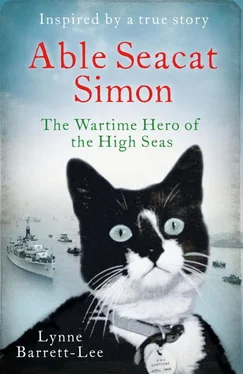Ever mindful of both my mother and Jack’s words (on one thing they were agreed – never pass up the opportunity to take a nap) I’d then taken myself off for a sleep down in the galley, which was always a good choice when the dawn was breaking, both for the warmth of the ovens (always nice after a rat hunt) and the cook, who’d be busy preparing the crew’s breakfast, which inevitably meant there was a good chance of being given a scrap of bacon. I’d been fast asleep, too, it having been a long night and a busy one, what with all the strange comings and goings in the officers’ wardroom and the many signals Jack was sending back and forth to Shanghai.
Most telling was that Captain Skinner seemed to be taking the threat seriously. No, this wasn’t our war – I’d heard that said enough times that I could be in no doubt of it – but as we were going to be in what was agreed to be a potential war zone, he had already taken precautions. As soon as we’d slipped our mooring at Shanghai, headed towards Woosung and the Yangtse, he’d ordered a detail of ordinary seamen to stitch together several tarpaulins, in order to make two enormous flags. These they then painted in a precise pattern of red, white and blue, to match the Union Jack that had already been painted on the quarterdeck.
The new flags, not quite dry, were then rolled up over oars taken from the whalers, and fixed from the guardrails with sailmaker’s twine – both ready to be unfurled again at a moment’s notice, so that no one could be in any doubt that the Amethyst was a British ship, going about its lawful business for the Royal Navy.
My first real taste of war came without warning. And I must have slept deeply, because I was not so much nudged into wakefulness as pitched headlong into it, by the sound of instructions echoing round and round the voice pipes – by orders being relayed with an urgency I’d never heard before; by the furious ringing of the bell that had only one meaning: that the crew were being mustered to their action stations.
Wide awake now, I lifted my nose to see what I could get wind of on the air, but it was the captain’s tone of voice that told me most. Something had happened. Or was about to. Something bad. I could sense it. I stretched long and hard and jumped down from the stove side. While the cook ran off to where he was supposed to be manning a fire hose, I hurried back up to the bridge to see what was going on.
The passageways were busy, everyone rushing to be somewhere, looking preoccupied and tense, and I could almost taste the fear that seemed to travel with them. Keeping close to the bulkheads, and out of the way of running feet, I padded quickly along my usual, now long-familiar route, feeling the same peculiar mixture of excitement and anxiety that had accompanied me on that other journey, almost a full year ago now, when I’d been tucked safely out of sight inside George’s tunic. That sometimes felt as if it was a lifetime ago.
In some ways, it really was a lifetime ago, as I’d now been on the Amethyst for longer than I’d lived in Hong Kong, and, apart from when my mother visited me in snatches of strange, wistful dreams, the memories of that time were fast fading. I’d finally got my ‘sea legs’, just as George had always told me I would, and was now, nose to tail-tip, a sailor. Which no doubt meant I now had something of a sailor’s intuition to go with my animal instinct, because there was definitely a quiver in my whiskers; a sense that testing times might well lie ahead.
Though the fog had now cleared, the morning sky still looked bruised when I emerged out onto the deck, and I wondered if more might be on the way. But not as much as I wondered what other dangers lay in front of us – ones not of nature’s, but of human design.
I padded across the quarterdeck, feeling the dewy dampness on the freshly painted corticene beneath my paws, and thought the time might have come to deploy the Union Jack flags. And no sooner had I taken up my usual post on the electrical box at the rear of the bridge than all the reassurance we’d hung on to of being a neutral party was blown out of the water at a stroke.
Though I’d not experienced war, I had known the sort of terror that grips you when you know someone or something means you harm. Someone meant to harm us now. I just sensed it.
The attack, when it came, though, seemed completely out of the blue. One minute the captain was relaying directions to the wheelhouse via the voice pipe, the next, there was a flash of flame on the shore, followed by a terrible screeching wail, and it was as if the river we’d been previously gliding along was boiling, exploding, rising – up, up, up, up! – before my eyes, in great fountains of hissing, rushing water.
Both the captain and the first lieutenant grabbed their binoculars and raised them, scanning the place from which the eruption of water might have come. ‘Watch for the flashes on the bank!’ barked the captain.
Though the fog had gone, the shore was still distant and murky – a hazy and indistinct bluey grey. And as I watched, another flash came, and another wall of white water exploded, this time so close it almost showered us all. I felt my claws scrabbling for purchase and my heart starting to pound, and wondered if I was about to use up every one of my lives all at once – wondering if we all were; feeling terrified, terrified , for my friends. I hadn’t felt such fear since the day I had watched my mother die, and had never expected to again. I had never experienced shell fire, or anything remotely like it, and the sight and sound – the terrifying nearness of the explosions – came as such a shock that all my fur stood on end. And it seemed they weren’t done with us yet. As I struggled to keep my balance, further licks of flame bloomed on the north bank, and more fountains of water streaked skyward.
Captain Skinner lowered his binoculars, his face set and watchful. Then he leaned into the voice pipe that snaked down below. ‘Bridge to wheelhouse,’ he barked. ‘Increase speed to 15 knots!’ I could hear men all over the ship still hurrying to their various action stations. ‘Number One,’ he said to Weston. ‘See if you can get that bearing.’
Thankfully, the firing ceased almost as soon as it started, and the whole thing was over in a matter of moments. And as I quivered behind Captain Skinner, wondering quite what had just happened, I was reassured to hear his voice take on a less anxious tone.
‘Looks like we’ve just been caught in the crossfire,’ he said to Weston. ‘That salvo clearly wasn’t meant for us, or they would have hit us, wouldn’t they? Perhaps it was just a show of strength.’
‘Or they didn’t see the ensign,’ Weston suggested.
‘Maybe so.’ He paused and peered across at the north bank, which clearly told him little. ‘Well, unless we’ve an errant communist shore battery on our hands. Order the X gun crew to unfurl the Union Jacks just to be on the safe side.’ The first lieutenant did so. ‘In any event,’ he mused, scanning the north shore once again through his binoculars, ‘we’re sitting ducks and need to be clear of this as soon as possible.’ He leaned again to the voice pipe. ‘Bridge to wheelhouse. Let’s have 19 knots now. Full ahead.’
He turned to me then. ‘You still here, Simon? Looks like you’re finally seeing a bit of action, eh?’ He stroked me absently. ‘Let’s hope we don’t see any more, eh?’
It was a wish that was not to be granted.
We continued up the river for several minutes, everyone on the bridge tense and watchful. Despite Captain Skinner’s apparent confidence that the shells hadn’t been meant for us, there was still a sense of nervous anticipation in the air. He’d been right. Whoever they’d been meant for – the nationalists on the south bank, presumably – we were right in the path of any further fire directed their way.
Читать дальше












